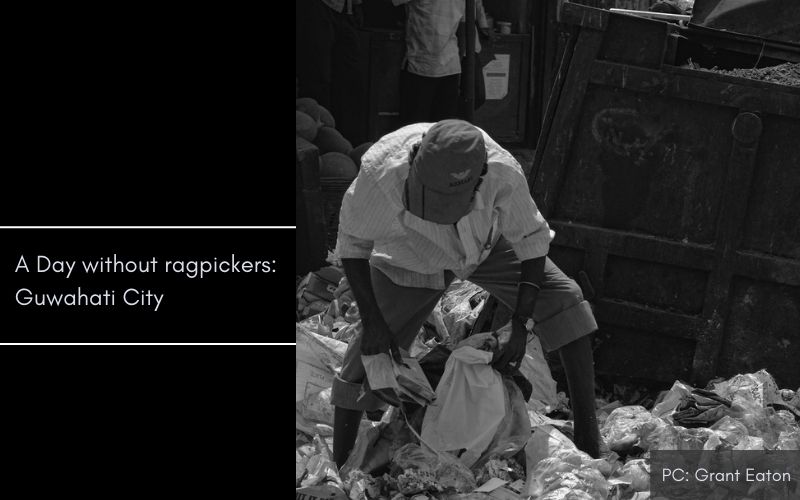
A Day without ragpickers: Guwahati City
Before going out in the morning, the most important thing to do is to wrap up our waste materialsand dispose it off in the dustbin. And then we get on with our day as usual. But what after that? The reality is that we, the common people are more concerned with removing waste from our respective households; but not from this city or the planet! Strange right? Everyone wants their homes to be clean, butthey never bother what will happen to the bags if it does not taken by municipality garbage trucks. Even In this era, at least 20% of the civilised society throws garbage in roadside dumps from cars and scooters, and surprisingly 85% of the uncivilised society throws the same in rivers, ponds, drains, and roadside dumps.
The Actual process:
The actual process by which Guwahati Municipal Corporation (GMC) works should be known by all. GMC, with the help of IIT Kharagpur has started solutions for curbing waste products and it has also given solutions for sustainable waste management. For example, we desperately need segregation machines because a lot of daily waste like sanitary napkins, hospital waste, cannot be dumped in the open. GMC has also provision for solid waste management; just that people are not aware of them.
Very rarely known is the in-house composting project known as The pilot project. The main motive of this daily dump project is to provide doorstep provision of composting and to install the Organic Waste Composter Aaga 550 (for bulk generators) in 4 apartment complexes (with 24 flats each).
There are various campaigns and meetings that are organized in order to rise some awareness on how to manage the waste. There are different rules and regulations for households, street food vendors, meat-fish markets, vegetable markets, multi-storeyed buildings, construction waste, hospital and nursing home wastes, etc. They are ordered to provide a large container with lid which may match with the transportation system of the local body and deposit all the waste generated in the premises in such containers. Hospitals are strictly advised not to dispose off the biomedical waste in either municipal dustbins or other waste collection or storage site meant for municipal solid waste. On the other hand, slum areas are provided with large community bins where they can dispose off their daily wastes.
What people do!
Whether we use it or not, GMC has indeed facilitated us with some decent provisions for organized waste disposal across the city. But as the typical Indian mindset goes, we have this problem of dumping trash anywhere outside in the open, or dispose it someplace, where others can’t see. Some people choose to dump their trash in desolate places during late-night drives. And there are many people who are less conscious about the environment, and does not think twice before throwing plastic waste in drains; knowing very well that it will remain there for years, blocking the passage of our sewage system.
Are people really careless or they do they have some other reasons to do so?
When I tried asking two or three people about this, they said,‘normally we use the dustbin, but sometimes when we are getting late for the office or miss the municipality garbage trucks, then we have to throw it in the roadside dump areas’. It may not be a serious issue when done alone. But if we pull up statistical data, we find that every 4 people out of 10 misses the municipality garbage truck, or are late for the office daily. So, we can imagine the amount of garbage that are thrown away improperly every month.
Ragpickers: the real heroes.
I’m sure majority among us may have never cared to wonder what an average day looks like for a ragpicker. During an interview, Bharati Chaturvedi, Director of Chintan (an NGO that works with waste pickers and other recyclers, to convert waste to social wealth) stated that ragpickers are the real heroes and are an essential part of the waste management system. Ragpickers literally touches the wastes, sees what are the things they can pick for their use. They also empty the bottles, cans and also separates the metal objects from the waste.
It might come as a shock to those who aren’t aware, that garbage trucks carry waste worth 75 lakhs on a daily basis in big metro cities. And if you were wondering, why would anyone choose the life of a ragpicker, it is this reason mentioned above. In an interview, a ragpicker once said, ‘Garbage yields a lot of money, madam’. There are several small businesses who purchases the trash from ragpickers and sell it to bigger companies for recycling as scrap materials.
The overview:
The ragpickers are the backbone of informal waste management sector in India. They do this filthy job just to earn money. Waste that are ignored by the common masses, end up in the landfills. Ragpickers collect and segregate this waste and take it to the right channels for recovery. But the system needs to be better than that. The unorganized waste management can get rid of only a minuscule amount of waste being generated everyday. The rest of the garbage continues to burden the Earth and contribute to environmental hazards, climate change and more. The simplest way to reduce the burden and simplify the job of those involved in the waste management cycle would be to start building a habit of separating dry waste, wet waste, bio-degradable waste, non-biodegradable waste in our homes itself. It will make it very easy for municipality as well as the ragpickers segregate the waste and take it forward for recovery. It will take time to have an organized system for managing day-to-day waste, but steps like this can contribute to build up a better and healthy environment for our surroundings.
Disclaimer: The opinions expressed in this article are those of the author's. They do not purport to reflect the opinions or views of The Critical Script or its editor.

Newsletter!!!
Subscribe to our weekly Newsletter and stay tuned.

















Related Comments